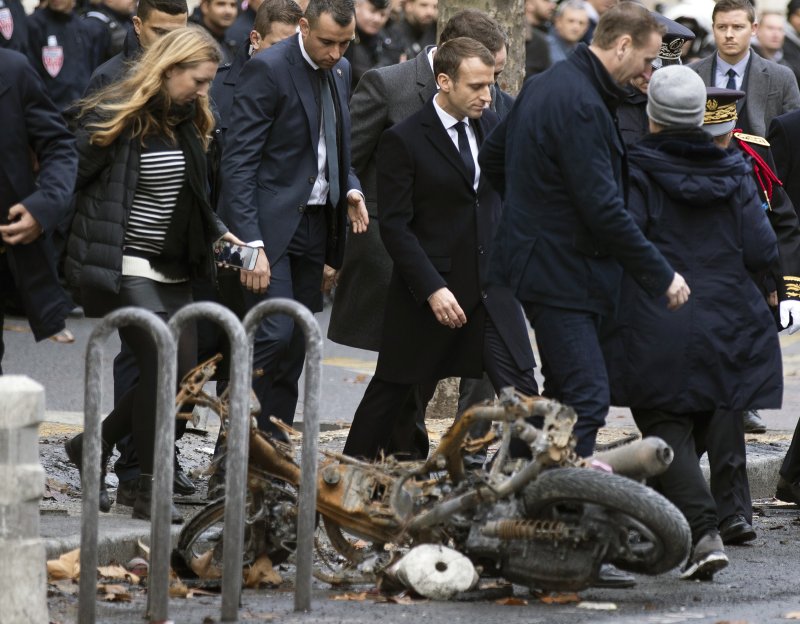French President Emmanuel Macron (C) assesses the damages of the "Yellow Vests" protest a day earlier, next to the Champs Elysee in Paris on Sunday. Photo by Etienne Laurent/EPA-EFE
Dec. 4 (UPI) -- "Le peuple est contre le regime." The people are against the regime.
I was shocked reading this graffiti on the Arc de Triomphe the day after the demonstrations and riots in France. I felt I was reading graffiti in the streets of Cairo or Damascus, Syria. The French feel now that the state is a "regime"? Since when in their demands do they use the word "people"? It is usually either the left the right or the unions. I felt I was in the Arab world.
What is happening to France? Isn't it a democracy with a representative government? Why this regression? Why do the people, the general public, feel alienated from the government? The citizen feels that the state does not represent him? Isn't this an elected government? What happened to the social contract on which the governance system is built? The people are against the regime!
I have been going to France for the last 20 years. I must admit, the French complain by nature. But I have never seen them as angry as I have seen them this time. People can't pay their bills anymore. They can't afford the rent. They can't support their families. What happened to the "socialist" system that is supposed to provide a decent living to everybody? The person making 2,000 euros a month, who was middle class 10 years ago, is now considered poor.
People are angry, very angry. French President Emmanuel Macron had the ingenious idea to cut taxes on businesses to boost the economy, a similar step to what U.S. President Donald Trump did. However, unlike the United States, France can't afford a growing deficit. Macron had to find the money somewhere else. The easiest way: the indirect tax. Taxing a product that everyone uses and that everyone needs to buy, no matter what the price is: fuel.
If you are a banking executive making a million euros a year, a 100-euro a month increase in fuel consumption won't affect your lifestyle. However, for those who make the "SMIC," or minimum wage, as it is called in France, a hundred euros can make a big difference. Everyone is complaining: the waiter, the shop keeper, the taxi driver...everyone. I took a taxi on Sunday afternoon to go to the airport. The taxi told me that he now works seven days a week to make ends meet. And this is not a sure thing.
The idea of cutting taxes to boost the economy might be a good one and it will have a positive effect on the entire country in the long run. Meanwhile, people are suffering big time and it is not sure they can last until they reach the "long run." Macron has looked for the wrong spot to compensate for his tax cut. Instead of taxing the poor to allow businesses to make more profits, he should have thought of a plan to spend less.
The French government is plagued with a bloated bureaucracy. Every graduate from the ENA (Ecole Nationale d'Administration) aims at landing a high-profile job at the government, where he will enjoy plenty of benefits, a fat salary and employment for life. Macron could have done better by freezing government hiring. He could have started by not replacing those who retire every year. He should have restructured the government and rendered it more efficient. And as spending decreased, he could have gradually decreased the taxes for the businesses.
Initially, a small decrease in taxes might not have a big effect on the profitability of those companies. The government could have laid down a five-year plan to gradually decrease spending and couple it with a decrease in corporate taxation. This would have spread optimism and encouraged companies to invest more, knowing that in five years they will maximize their profits.
The French should rethink their "socialist" system. Though it claims to provide equal opportunities for everyone and provide decent living for every citizen, in fact, it is a very elitist system. There is very little room to progress. If you are born poor in Frances, chances are, you are going to die poor in France.
The demonstrations that are occurring every Saturday under the name of "Gilet Jaune," or the yellow vest, referring to the working class, are a grave issue. Those demonstrations do not represent a faction, a union or a political party that have certain demands from the government. They embody the general public, who no longer feel represented by the system. Macron should take those demands seriously and put his bureaucracy in shape, as the last thing a democracy would want is to be called by its citizens a "regime."
Dania Koleilat Khatib is executive director of the Al Istishari Al Strategy Center for Economic and Future Studies, a UAE-based independent think tank. She specializes in U.S.-Arab relations and researches sectarianism, extremism and governance. Her book "The Arab Lobby and the U.S.: Factors for Success and Failure" was published by Routledge UK and translated to Arabic.















